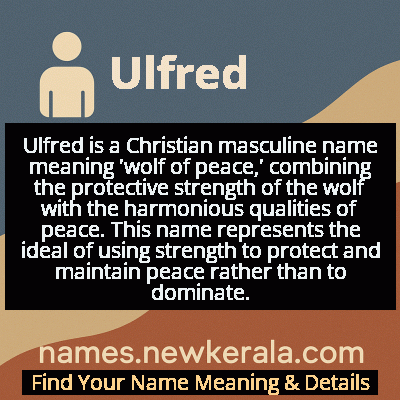Ulfred Name Meaning & Details
Origin, Popularity, Numerology Analysis & Name Meaning of Ulfred
Discover the origin, meaning, and cultural significance of the name ULFRED. Delve into its historical roots and explore the lasting impact it has had on communities and traditions.
Name
Ulfred
Gender
Male
Origin
Christian
Lucky Number
3
Meaning of the Name - Ulfred
Ulfred is a Christian masculine name meaning 'wolf of peace,' combining the protective strength of the wolf with the harmonious qualities of peace. This name represents the ideal of using strength to protect and maintain peace rather than to dominate.
Ulfred - Complete Numerology Analysis
Your Numerology Number
Based on Pythagorean Numerology System
Ruling Planet
Jupiter
Positive Nature
Optimistic, inspirational, and creative.
Negative Traits
Scattered, exaggerating.
Lucky Colours
Yellow, gold, purple.
Lucky Days
Thursday.
Lucky Stones
Yellow sapphire.
Harmony Numbers
1, 2, 9.
Best Suited Professions
Arts, writing, communication.
What People Like About You
Creativity, optimism.
Famous People Named Ulfred
Ulfred of York
Religious Leader
Anglo-Saxon bishop known for his diplomatic efforts during Viking invasions
Ulfred the Chronicler
Historian
Monastic scribe who preserved important Anglo-Saxon historical records
Ulfred of Mercia
Nobleman
Christian noble who helped establish peace treaties between Saxon and Danish settlers
Name Variations & International Equivalents
Click on blue names to explore their detailed meanings. Gray names with will be available soon.
Cultural & Historical Significance
The name's cultural significance extends to its representation of the Christianization process in Northern Europe, where traditional pagan symbols were reinterpreted through a Christian lens. The wolf, once primarily a symbol of ferocity in battle, came to represent protective qualities and loyalty to one's spiritual community. This transformation mirrors the broader cultural shift where warrior virtues were redirected toward spiritual warfare and protection of the faith. Ulfred thus stands as a testament to the complex process of cultural synthesis that characterized the spread of Christianity throughout Germanic lands.
Extended Personality Analysis
Individuals named Ulfred are often perceived as having a unique balance of strength and gentleness, reflecting the name's meaning of 'wolf of peace.' They typically exhibit protective instincts and loyalty reminiscent of wolf pack behavior, combined with a deep-seated desire for harmony and resolution of conflicts. This combination often makes them natural mediators who can assert authority when necessary but prefer diplomatic solutions. Their personality tends to blend quiet confidence with thoughtful consideration, making them reliable in crises while maintaining a peaceful demeanor in everyday interactions.
Many Ulfreds display strong family values and community orientation, often serving as stabilizing forces in their social circles while possessing the inner strength to defend what they value. They tend to be patient and observant, carefully assessing situations before acting, much like a wolf surveying its territory. This thoughtful approach, combined with their inherent protectiveness, makes them excellent leaders in situations requiring both compassion and firmness. Their dual nature allows them to navigate complex social dynamics effectively, earning respect through both their strength of character and their commitment to peaceful resolution of differences.
Modern Usage & Popularity
In contemporary times, Ulfred remains quite rare but has seen a modest revival among parents interested in historical names with strong meanings. It's primarily used in Scandinavian countries, particularly Sweden and Norway, and among communities with Anglo-Saxon heritage. The name appeals to those seeking distinctive yet traditional names that aren't overly common. Recent years have shown a slight increase in usage as part of the broader trend toward vintage and meaningful names, though it remains outside the top 1000 names in most English-speaking countries. Modern Ulfreds often go by nicknames like Ulf or Fred in casual settings, and the name is occasionally chosen by parents looking for names that honor both Scandinavian and English family heritage while carrying positive symbolic meaning.
Symbolic & Spiritual Meanings
Symbolically, Ulfred represents the reconciliation of apparent opposites - the wild and the civilized, strength and peace, protection and gentleness. The wolf component symbolizes loyalty, family protection, and instinctual wisdom, while the peace element represents harmony, reconciliation, and spiritual calm. This combination creates a powerful metaphor for the Christian ideal of being 'wise as serpents and gentle as doves.' The name embodies the concept of strength in service of peace, suggesting someone who possesses the courage to defend what is right while maintaining a commitment to peaceful resolution. It also symbolizes the transformation of primal energies into constructive purposes, making it deeply meaningful in spiritual contexts where inner strength must be balanced with outward compassion.

